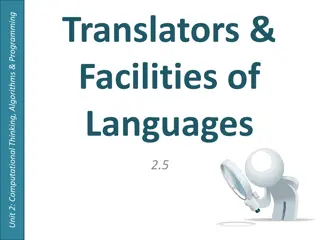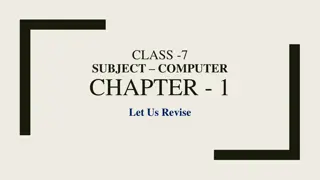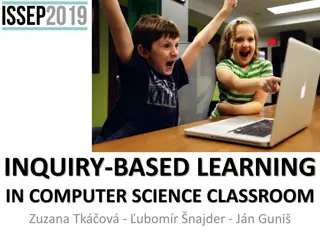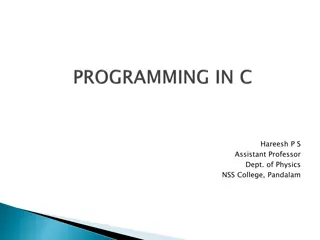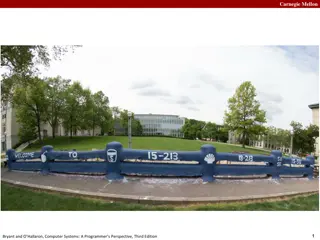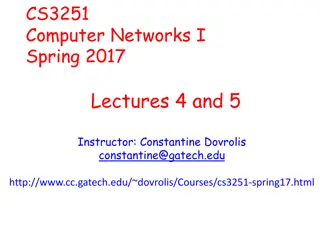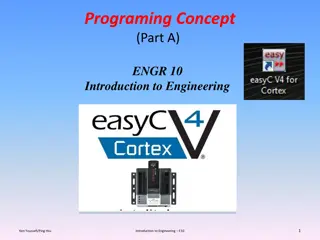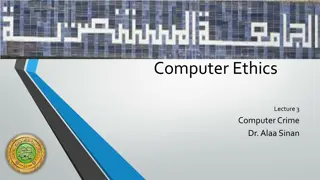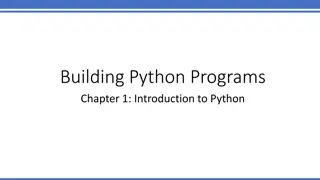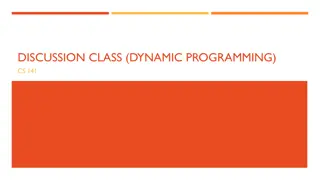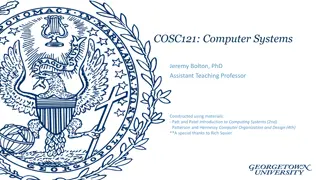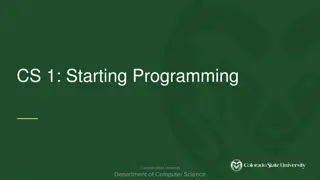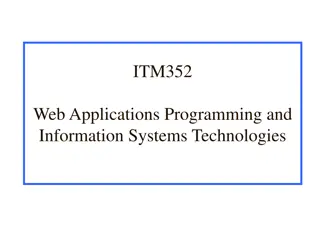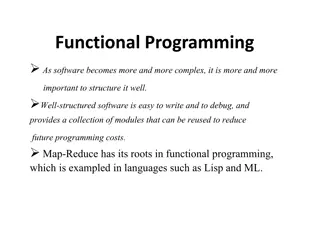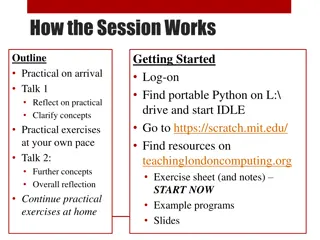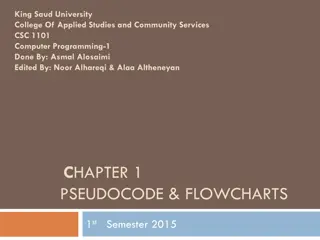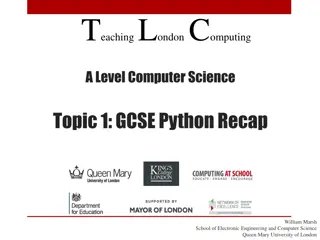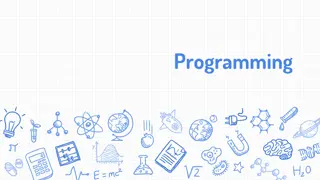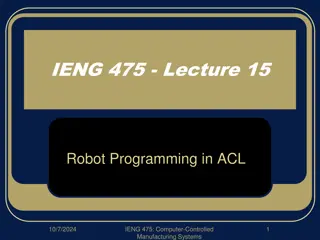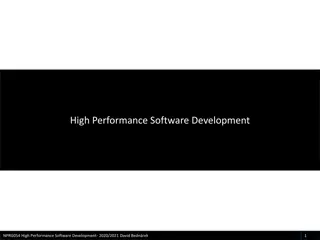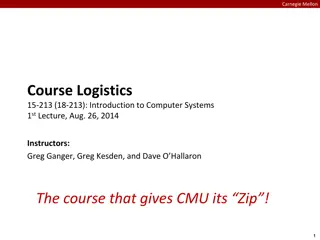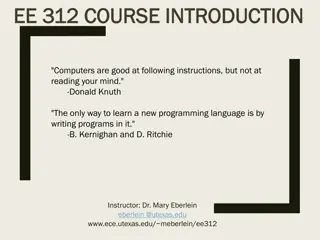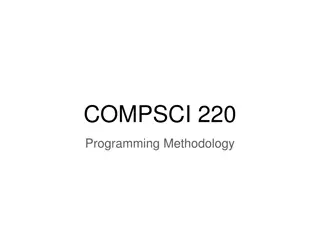Understanding Computer Organization and Architecture
A computer system is a programmable digital electronics device that processes data as per program instructions to provide meaningful output. It comprises hardware and software components, with hardware being the physical parts and software essential for driving the hardware. Computer organization fo
14 views • 71 slides
Decision Analysis and Operations Research in Management
This content delves into Management Decision Analysis and Operations Research techniques such as Linear Programming, Integer Linear Programming, Dynamic Programming, Nonlinear Programming, and Network Programming. It covers the phases of an Operations Research study, mathematical modeling for decisi
0 views • 36 slides
Understanding Computer Architecture and Organization
Computer architecture and organization are fundamental aspects of computing systems. Computer architecture focuses on the functional design and implementation of various computer parts, while computer organization deals with how operational attributes come together to realize the architectural speci
3 views • 40 slides
Understanding Programming Languages and Translators in Computational Thinking
Programming languages are categorized into generations, from low-level machine code to high-level languages. Translators like assemblers, compilers, and interpreters help convert code for computer execution. Each generation has its characteristics and purposes, affecting ease of programming, debuggi
1 views • 18 slides
Computer Science Department Information and Courses Offered
The Computer Science Department provides information on courses offered for GCSE or BTEC qualifications, specifically focusing on the AQA GCSE in Computer Science. The course equips students with valuable thinking and programming skills essential in the modern workplace, covering key concepts and pr
3 views • 7 slides
Module 2: PSEA and Safe Programming Training of Trainers (ToT) by CRS HRD
This Module 2 focuses on PSEA and Safe Programming, covering key sessions on understanding safe programming, identifying protection and SEA risks, and mitigating risks. It emphasizes the importance of safe programming in increasing safety, dignity, and access, with staff playing a crucial role. Part
2 views • 19 slides
Understanding Computer Programming: Basics and Beyond
In this chapter, we delve into the fundamental concepts of computer programming. We explore the definition of a program, the role of programming languages, types of programming languages, and generations of programming languages. Additionally, an assignment is provided to reinforce the key learnings
0 views • 25 slides
**Exploring Inquiry-Based Learning in Computer Science Education**
Inquiry-based learning (IBL) in computer science classrooms focuses on fostering communication, collaboration, decision-making, and problem-solving skills among students. The approach involves students constructing knowledge through independent, active activities based on real-world experiences. How
0 views • 18 slides
Understanding Object-Oriented Programming (OOP) in Python
Python is a versatile programming language that supports various programming approaches. Object-Oriented Programming (OOP) is a popular method in Python where objects are created to solve programming problems. OOP in Python focuses on creating reusable code, following the principle of DRY (Don't Rep
1 views • 35 slides
Evolution of Algorithms and Computer Science Through History
The history of algorithms and algorithmic thinking dates back to ancient times, with the development of general-purpose computational machines by Charles Babbage in the 19th century marking a significant advancement. The term "computer science" emerged in 1959, encompassing theoretical computer scie
1 views • 39 slides
Understanding Programming Languages: Levels and Basics
Programming languages facilitate communication between humans and computers, with machine language being the fundamental binary code understood by computers. Different levels of programming languages exist, from low-level machine language to high-level languages like C. Natural languages are meant f
0 views • 35 slides
Introduction to Computers and C++ Programming Lecture 1 - Overview and Basics
This lecture covers the fundamental concepts in computer systems and programming using C++. Topics include the main components of a computer, bytes and addresses in memory, computer systems hardware and software, understanding programs, programming languages, compilers, preparing and running C++ pro
1 views • 21 slides
Web Application Development and Programming CTE Program Overview
Viera High School offers a comprehensive CTE program in Web Application Development and Programming, taught by Mr. Dohmen. Students learn popular programming languages like Python, SQL, JavaScript, Java, C#, and C. The courses cover web programming, JavaScripting, and PHP programming, providing cert
1 views • 7 slides
Carnegie Mellon Computer Systems Overview
The content provides an overview of computer systems and network programming at Carnegie Mellon University. It covers topics such as client-server interactions, I/O handling, socket programming, and robust I/O practices. The lectures discuss concepts like TCP/IP communication, C Standard I/O, Unix I
0 views • 67 slides
Overview of Socket Programming in Computer Networks
This information presents a detailed overview of socket programming, covering topics such as Socket API, BSD Socket API, types of sockets (TCP vs UDP), and the basic functions related to I/O multiplexing. It explains the concept of sockets, their various types, their similarities, and differences, a
3 views • 53 slides
Introduction to Programming with RobotC in Robotics Education
Programming in robotics involves giving specific directions to a robot using software like RobotC. This introduction covers the basics of programming, software organization, and how to get started with RobotC through creating flow charts and programming tasks. Learn about setting up RobotC, creating
0 views • 8 slides
Introduction to Programming and Computer Instructions
Programming is the process of creating instructions for computers to follow and accomplish tasks. It involves turning human language instructions into detailed binary machine language. Before learning programming, individuals may have different levels of experience, ranging from no experience to pro
0 views • 16 slides
Development of Attosecond Theory for Nobel Prize through Verilog Programming
Attosecond generation is a crucial technique for creating attosecond pulses by manipulating radiation waves. This research paper focuses on developing the Attosecond generation equation through Verilog programming and validating it using test programming techniques. The interface between equations,
0 views • 15 slides
Introduction to Computer Programming in Engineering
Computer programming in engineering involves breaking down tasks into small steps to instruct a computer. This process requires understanding programming languages such as C, C++, and Java, and concepts like Object-Oriented Programming (OOP). The sequential execution of expressions and the importanc
0 views • 36 slides
Understanding Computer Crimes and Prevention Strategies
Computer crimes involve illegal acts utilizing computer systems, leading to various consequences. This lecture covers the types of computer system attacks, motives behind computer crimes, costs, prevention strategies, and reflection on the discussed topics. It emphasizes the increasing scope of comp
1 views • 20 slides
Exploring Computer Science and Python Programming Basics
Introduction to Computer Science processes and problem-solving, highlighting the significance of programming languages like Python. Learn about procedural, functional, and object-oriented programming languages, with a focus on the simplicity and widespread usage of Python for beginners. Dive into th
0 views • 45 slides
Dynamic Programming in Computer Science: Maximizing Smartness on a Plane
Discussing the application of dynamic programming in Computer Science class, specifically solving a problem of maximizing total smartness of students seated in a plane. The discussion covers strategies like memorization, recursion, base cases, and an algorithm to achieve the optimal solution. It als
0 views • 12 slides
CS252 Systems Programming Course Overview
This course overview covers topics such as C programming review, Unix basics, Unix systems programming, and grading details. The course includes labs on C/C++ programming, Unix shell scripting, and writing your own shell. Communication is emphasized through Piazza for questions/answers and Blackboar
0 views • 41 slides
Understanding COSC121: Computer Systems and Assembly Language Programming
Delve into the world of COSC121 led by Assistant Teaching Professor Jeremy Bolton, PhD. Explore essential topics in computer systems, assembly language programming, and hardware design. Get hands-on experience with programming in LC-3, understanding machine language, and writing assembly code. Enhan
0 views • 29 slides
Introduction to Programming Concepts at Colorado State University
Engage in the fundamentals of programming at Colorado State University's Department of Computer Science. Explore topics such as variable declaration and assignment, data types, and the importance of programming. Develop essential skills to read, write, and understand basic program structures. Enhanc
0 views • 14 slides
Introduction to Programming Languages and Functional Programming with OCaml
Welcome to Lecture 1 of CSEP505 on Programming Languages focusing on OCaml and functional programming. Professor Dan Grossman introduces the course, discusses the importance of studying programming languages, and shares insights on course mechanics and content. Topics include staff introductions, co
0 views • 84 slides
Understanding ITM352 and Its Role in MIS
Welcome to ITM352, a course focusing on acquiring basic programming skills in a business context. This course emphasizes hands-on experience in developing relevant software applications, addressing real technology problems, and fostering rapid self-learning of IS/IT technologies. Misconceptions arou
0 views • 36 slides
Understanding Functional Programming Paradigm
Functional programming emphasizes well-structured software that is easy to write and debug, with reusable modules to reduce future programming costs. It introduces higher-order functions and first-class function values, fostering declarative programming for tasks like symbolic data manipulation and
0 views • 21 slides
Essential Principles of Teaching Programming Languages
Foundational concepts in programming form the core of computing. This encompasses understanding programming fundamentals, teaching language aspects effectively, statistical programming for data analysis, and guiding students unfamiliar with programming environments towards grasping the logic and sim
0 views • 23 slides
Exploring Computer Programming Principles
Dive into the world of computer programming, covering high-level and machine languages, compilers, interpreters, writing programs, top-down design, and the array of programming languages available. Understand the essentials of building code to control computers, the diversity of programming language
0 views • 23 slides
Transitioning from Scratch to Python: A Practical Approach for Learning Textual Programming
Explore the transition from visual programming in Scratch to textual programming in Python using Turtle Graphics. Engage in practical exercises, clarify key concepts, and reflect on the challenges and progress in learning core programming concepts. Utilize resources from TeachingLondon Computing to
0 views • 21 slides
Introduction to Pseudocode and Flowcharts in Computer Programming
Explore the concept of pseudocode and flowcharts in computer programming through a detailed explanation of their use in problem-solving, algorithm development, and program design. Learn how to define a problem, plan a solution, code a program, compile and run it, and test/debug the program effective
3 views • 17 slides
Introduction to Programming Concepts in A-Level Computer Science
This material covers a recap of GCSE Python programming concepts and outlines the course contents for A-level curricula at William Marsh School of Electronic Engineering and Computer Science, Queen Mary University of London. It explores the essence of programming, problem-solving techniques, computa
0 views • 33 slides
Introduction to Programming and Scratch - Fun Way to Learn Coding
Programming involves giving instructions to a computer using languages like C, Java, Ruby, and Python. Explore block programming with Scratch, a free site by MIT that simplifies learning coding concepts across different languages. Engage in challenges like making sprites move autonomously or respond
0 views • 7 slides
Computer-Controlled Manufacturing Systems: Robot Programming in ACL
Explore the world of robot programming in ACL through hands-on assignments, documentation practices, and good programming principles. Learn about advanced command languages, teach pendant techniques, and programming sequences for efficient manufacturing systems. Dive into creating ACL programs, unde
0 views • 17 slides
High Performance Software Development - Topics and Related Lectures
This course on High Performance Software Development covers various topics such as modern programming styles, CPU properties, performance tuning, compiler optimization, memory hierarchy, and more. It also emphasizes the importance of using vector instructions within C/C++ for parallel programming. T
0 views • 10 slides
Carnegie Mellon Course Logistics: Introduction to Computer Systems
Carnegie Mellon University offers the course 15-213: Introduction to Computer Systems, taught by instructors Greg Ganger, Greg Kesden, and Dave O. Hallaron. The course covers essential topics in computer systems and programming, emphasizing practical skills through lectures, labs, and exams. Recomme
0 views • 23 slides
CS 288-102 Intensive Programming in Linux Spring 2017 Course Details
Learn Linux programming, C language proficiency, Bash scripting, and more in this intensive course taught by Instructor C.F. Yurkoski. The course covers programming in Linux environment, command line interface, C language, client/server programming, and essential programming concepts like pointers,
0 views • 31 slides
Introduction to EE 312 Course and Computer Programming
Explore the introductory content for the EE 312 course featuring quotes by Donald Knuth and B. Kernighan. Get to know the instructor, Dr. Mary Eberlein, and the course objectives. Discover the teaching team, communication methods, and tips for success in the course. Dive into programming basics and
0 views • 16 slides
Functional Programming Concepts for COMPSCI 220 Programming Methodology
In this tutorial, we explore functional programming concepts in the context of COMPSCI 220 Programming Methodology. We delve into writing functions using `reduce` and discuss examples and implementations of various functions like sum, product, and string length calculation. We also analyze the diffe
1 views • 47 slides



